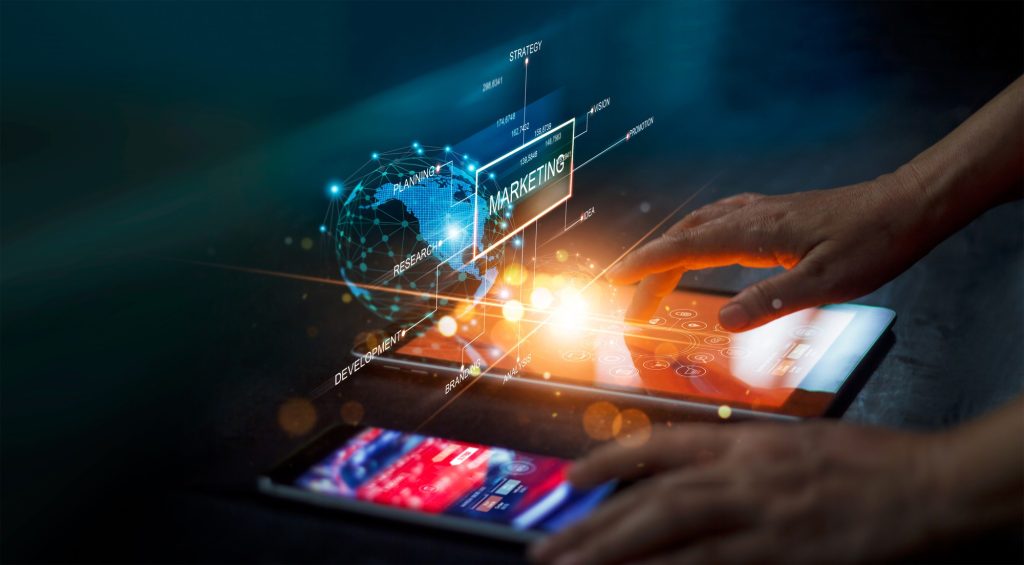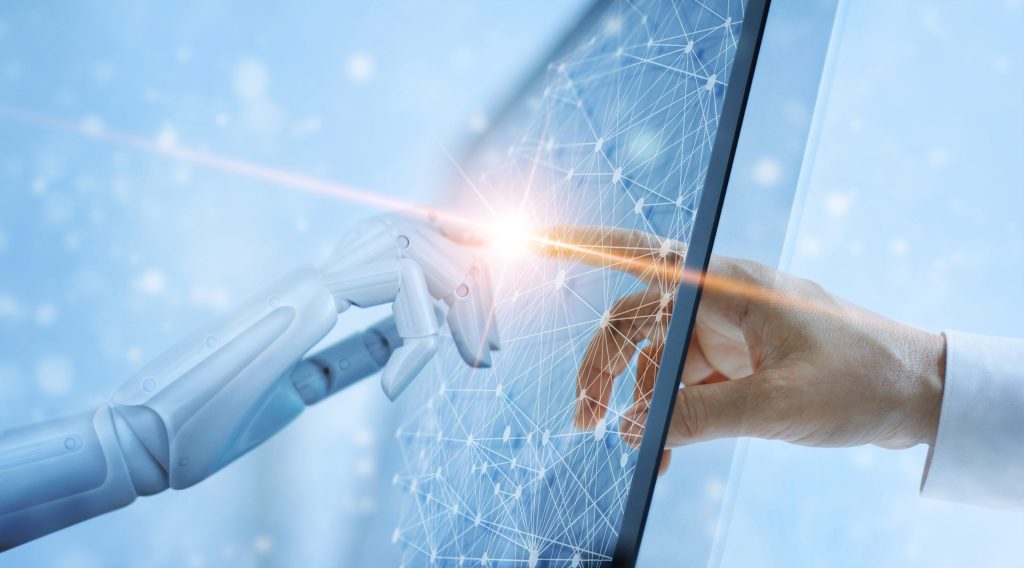AI Marketing – what is it exactly? Many companies – including the marketing teams – quickly implement intelligent technology solutions to increase operational efficiency while boosting customer experience.
Marketers, including affiliate marketers, can gain a more sophisticated, comprehensive picture of their target audiences by using AI platforms. The information gained from this process can then be leveraged to increase conversions while also reducing the marketing efforts and budgets.
What is Artificial Intelligence (AI) Marketing?
AI marketing makes automated decisions for you based on data collection, data analysis, and further observations of audience or economic trends that may affect marketing activities.
AI is frequently utilized in marketing initiatives where speed is critical.
AI technologies employ data and customer profiles to learn how to engage with customers effectively, then send them personalized messages at the perfect time without the need for marketing team members’ intervention, ensuring optimal productivity and minimal human resources.
Many modern marketers employ AI to supplement marketing teams or handle more tactical activities requiring less human finesse.
Among the AI marketing uses are:
- Data Examination
- purchasing media based on natural language processing
- Automated decision-making
- Real-time customization of content
It is obvious that artificial intelligence plays a critical role in assisting marketers in connecting with consumers. The following AI marketing components include today’s leading solutions for bridging the gap between massive volumes of customer data being collected and actionable next actions that can be used in future marketing campaigns.
Today’s artificial intelligence
Many businesses today utilize AI to handle small activities, such as:
- digital ad placement (also known as “programmatic ads“)
- improving prediction accuracy (i.e., sales projections)
- supplement human efforts in structured tasks, such as customer service.
- Businesses also use AI at every point of the customer journey.
When potential buyers are in the “consideration” phase and studying a product, AI will target adverts to them and guide their search.
AI-powered bots can help marketers understand their customers’ needs, increase their engagement in a search, nudge them in the desired direction. For example: to a specific web page, and, if necessary, connect them to a human sales agent via chat, phone, or video – allowing an agent to assist the customer in navigating a shared screen.
AI can help streamline the sales process by creating highly tailored product or service offers based on incredibly specific data about individuals, including real-time geolocation data.
Later in the buyer journey, AI can help with upselling and cross-selling and reduce the likelihood of clients abandoning their digital shopping carts.
For example, once a customer adds an item to their cart, AI bots can deliver motivational feedback such as “Great choice! Julia just purchased the same perfume.”
This has proven to increase conversion rates across shopping carts.

AI-powered marketing chatbots can handle simple questions like delivery timing or appointment booking and can escalate more complex ones to a human agent. In some circumstances, AI supports human reps by evaluating customers’ tone and offering alternate responses, instructing agents on how to satisfy customers’ demands, or recommending supervisor involvement.
The Structure of AI Marketing Strategy
Marketing AI is classified into two categories: intelligence level and whether it is stand-alone or part of a larger platform. Some technologies, such as chatbots, can fall into any of the categories; their classification is determined by how they are implemented within a specific application.
How will AI affect affiliate marketing?
The usefulness of AI in marketing is in its ability to assimilate and utilize data in real-time to forecast consumer behavior.
Although this type of data analysis is currently possible, it can be time-consuming.
Furthermore, it is always susceptible to human error or misinterpretation. Using AI to analyze customer data can reduce the amount of time necessary and eliminate the possibility of errors. This will enable marketers to assess and plan marketing efforts using reliable data.

In the medium term, I believe we will still need affiliates for one simple reason: the personal touch. People can develop trusting relationships with others. Would you put your trust in an AI algorithm to look after your best interests?
Time will show. But let’s have a quick look at how AI penetrates the marketing business already.
AI Marketing Statistics
- According to a recent PwC study, 72% view AI as a “business advantage.”
- In a June 2016 report, Weber Shandwick found that 68% of CMOs report their company is “planning for business in the AI era,” with 55% of CMOs expecting AI to have a “greater impact on marketing and communications than social media ever had.” According to another June 2016 report from Forrester, AI, machine learning, robots, and automation will result in a net loss of 7% of U.S. jobs by 2025.
- “80% of business and tech leaders say AI already boosts productivity.” (source: unbounce.com)
- In Salesforce’s sixth State of Marketing report, a whopping 84% of marketers reported using AI for marketing, up from 29% in 2018. (source: salesforce.com)
- The venture capital firm Loup Ventures asked prominent smart speakers hundreds of queries and found that in December 2018, Alexa correctly answered 72.5% of the time. Its accuracy improved 9% compared to 12 months prior. (source: iotworldtoday.com)
AL Marketing’s Upsides
Using AI in marketing can have a lot of advantages. Whether it’s a person utilizing AI for automation or a business employing it to boost productivity, the advantages appear to outweigh the drawbacks. Let’s have a look at the major advantages of artificial intelligence in marketing:
- Improves productivity
AI already enhances productivity, according to 80% of business and technology leaders. There is no doubting that a computer can perform human-like activities at breakneck speed when it comes to AI and machine learning. The faster the procedures grow, the more the machine learns. This greatly boosts productivity and enables the completion of lengthy, tedious chores at a far faster rate.
- It saves time and marketing efforts.
There is no doubt that having powerful AI technologies that increase productivity would save you time on tedious chores—searching for broken links on large websites, for example, or personalizing hundreds of individual emails and keyword analysis. With the assistance of AI, these and many other tasks can be made more efficient.
- It saves money
Marketing expenses might be exorbitant. Whether it is for staff or campaigns, marketing is more likely to have the highest budget allocation in a business. AI may really save money on marketing by improving ROI, creating more focused campaigns, and better understanding the target demographic.
- Enhanced personalization
For years, machines have been gathering data about consumers. This information can be used to personalize adverts and communicate with your customers. Facebook Ads is the most obvious example of this. They employ advanced artificial intelligence and machine learning to deliver adverts in a variety of ways that are more personalized to your audience.

Despite the great impact that artificial intelligence and machine learning can have on the marketing industry, marketers must consider some concerns…
AI Marketing’s Downsides
Modern marketing relies on an in-depth awareness of customer wants and preferences and the capacity to act swiftly and effectively on that knowledge. AI has risen to prominence among marketing stakeholders due to its ability to make real-time, data-driven decisions.
However, while considering how to best integrate AI into their campaigns and processes, marketing companies must exercise caution. AI tool development and applications are still in their early stages. As a result, there are a few issues to consider when integrating AI into marketing.
According to Roman Kniahynyckyj, this includes:
- Customers don’t always like chatbots or even talking to computers on the phone.
- Computers can’t do it without humans
- Algorithms can be wrong
Now, let’s see what kinds of AI marketing tactics we can utilize in a daily marketing routine.
AI-powered Automation of Marketing Tasks
These applications carry out repetitive, systematic tasks that necessitate modest degrees of intellect. They are intended to obey a set of rules or perform a planned series of actions depending on a given input, but they are incapable of handling complex situations such as nuanced customer requests. A system that automatically sends out a welcome email to every new customer is one example.
Simpler chatbots, such as those found on Facebook Messenger and other social media platforms, are also included in this category. They can assist consumers during basic encounters by guiding them through a specified decision tree, but they cannot interpret customers’ intent, deliver tailored solutions, or learn from interactions over time.
AI (artificial intelligence)
These algorithms are trained on massive amounts of data in order to make rather difficult predictions and choices. These models can detect images, decipher the language, segment clients, and predict how customers would react to specific activities such as promotions.

Machine learning is already used to power programmatic buying in online advertising, e-commerce recommendation engines, and sales propensity models in customer relationship management (CRM) systems.
It and its more complex counterpart, deep learning, are the hottest AI technologies and quickly become formidable marketing tools.
However, it is vital to note that existing machine-learning applications still only do specific jobs and must be trained using massive volumes of data.
Let’s now compare stand-alone AI to integrated AI.
Stand-Alone Apps
These are better regarded as distinct or independent AI programs. They are distinct from the principal channels via which customers learn about, purchase, or receive support for using a company’s offerings, as well as the channels through which workers market, sell, or service those offerings. Simply said, customers or employees must travel outside of traditional channels to access AI.
Consider the color-discovery app developed by Behr. The tool gives numerous customized Behr paint-color recommendations depending on the mood clients seek for their area, using IBM Watson’s natural language processing and Tone Analyzer capabilities (which recognize emotions in text).
Customers use the app to create a shortlist of two or three colors for the room they plan to paint. The actual sale of paint is then carried out outside the app, though a connection to Home Depot is provided.
Where Will Marketing AI Go?
According to experts, marketers can expect rapid changes due to AI’s ability to build on and improve itself. According to the co-owner and CEO of the Foresight Factory & Future Foundation – Meabh Quoirin, businesses and marketing departments aggressively use AI technology. They are eager to see the promised benefits materialize.
“It’s not just about automation for the sake of automation; if we can go faster, there’s more money to be earned.”
According to Quirin, how humans perceive technology, particularly in marketing, has progressed over the last five years and is likely to continue at a rapid speed.
She argues that AI has various applications in marketing, health, entertainment, and business, and technology is just the beginning.
Artificial intelligence breakthroughs may also alter our understanding of who we are and how marketers connect with humans and their technological extensions.
This invariably raises concerns about how people live, how their behaviors are recorded, and how they are monitored by government-run AI technology, such as facial-recognition software, another emerging AI notion.
When it comes to these redesigned interfaces, we are the ones who best understand the human, technical interfaces and how to design markets that are better than the sum of their parts.

Apple is the best illustration of this thus far. Apple TV, a recent innovation that Steve Jobs referred to as a “hobby,” is altering in-home entertainment and branding with AI notions. For a long time, Apple used this top-box method, with the Apple TV box sitting next to other cable boxes.
That most likely did not work. The difference occurred when Apple grasped that consumption is more of a matrix than a single box with a person staring at a TV screen.
If you want to conquer the living room, you must spread it throughout the house. Apple paved the way for marketers to develop interfaces that help consumers better navigate their lives by viewing the market as a matrix. After looking through the prism of today’s technology-powered environment, Apple and researchers created these breakthroughs enabled by AI.
AI transforms the way we do marketing, not just physically in the tech world but also symbolically, in terms of how we comprehend brands, customers, and market segments.
Conclusion
In 2022 digital marketing evolved into AI marketing.
The tools, capabilities, application cases, and benefits of AI in marketing are virtually limitless. I gave you four examples that I believe highlight how AI can be utilized very intelligently to make your day-to-day life as a marketer easier and more effective.
Marketing is being shaped by artificial intelligence. Marketers who do not support this transition will fall behind and eventually become irrelevant. Being data-driven is essential today, but you must also be prepared for the future, which is approaching faster than you can imagine.
Last Updated on December 8, 2023





